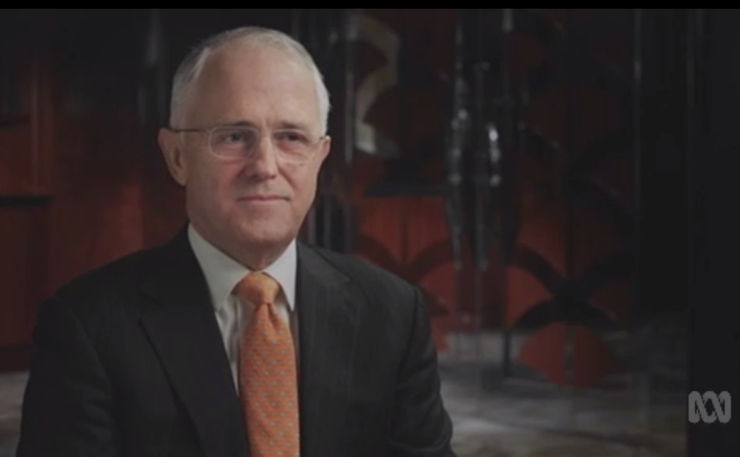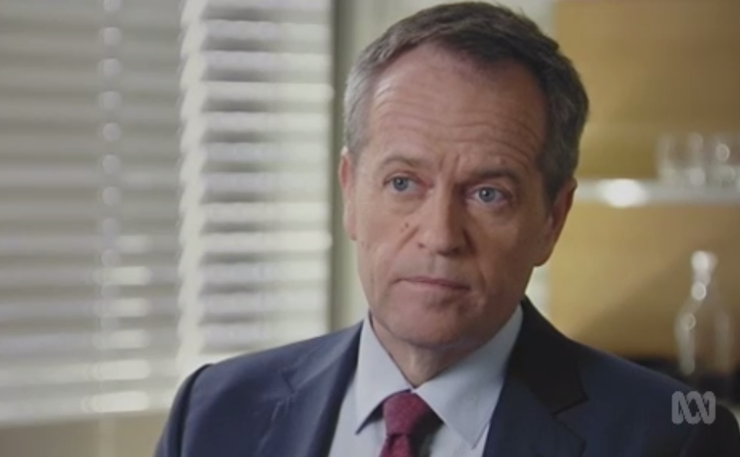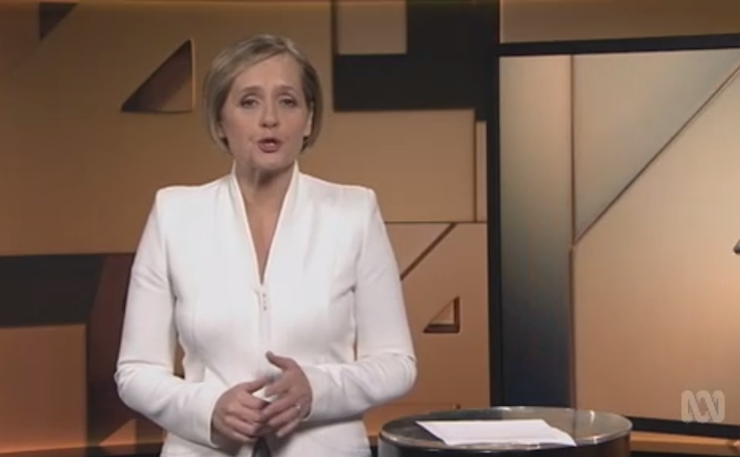The 2016 election has revealed just how compliant Australia’s media landscape has become. In some cases, it’s hardly a surprise. But the failure of the ABC to challenge narratives run by the Coalition is of serious concern, writes Sean Hosking.
As the outcome of the federal election has illustrated, we are currently experiencing a crisis in political governance in Australia from which there is no clear escape. The increasingly adverse social and economic effects of neoliberalism, combined with ballooning government debt and a public whose expectations of government remain wedded to the profligacy of the Howard era has in many respects led to a state of policy gridlock.
While the Labor party has shown signs of policy innovation, the Coalition remained caught in a pincer movement between right wing ideology, budget constraint and public expectations. Malcolm Turnbull, effectively held to ransom by the hard right of his party and with barely any palatable policy options left in the cupboard, was forced to go to the election with perhaps the biggest dog of a policy taken to the polls in living memory: a reheated circa 1980s $50 billion tax cut for the big end of town.
In doing so he was undoubtedly banking that he could overcome public concerns in regard to the fairness and equity of what amounted to discredited trickle down economics by rebadging it as “a plan for jobs and growth”. He was also no doubt banking that his task would be made easier by a largely compliant mainstream media. They did not let him down.
News Corp’s election coverage continued its partisan decline from that day in 1975 when journalists at The Australian went on strike protesting the paper’s anti-Whitlam bias in the run up to the election of that year. The distinction between objective news content and politically charged partisan op-ed commentary no longer exists in most of the Murdoch media with its various mastheads long since having defaulted on their fourth estate obligations and degenerated into active propaganda arms of the Coalition.
The election campaign again exposed the extent of News Corp’s extensive organisational and strategic links with the Coalition, with coordinated campaign messages and targeted commentary, most notably in relation to the “Labor war on business” and the “Labor soft on refugees” campaigns. Both saw Coalition members reciting the same slogans as those used in News Corp reporting and opinion.
Where New exhibited all the presence of a Rottweiler, Fairfax continued its sad decline. With the exception of the Australian Financial Review, which now functions primarily as a mouth piece for the Business Council of Australia, Fairfax is now so anaemic, so ravished by the collapse of its business model and inept management, that it barely registers as a blip on the radar of Australian political discourse. Thus we got more of Mark Kenny’s superficial score card political analysis, Peter Hartcher again displaying his penchant for developing special quid pro quo relationships with major political figures (Costello, Rudd, now Malcolm Turnbull), and barking mad editorials endorsing the Coalition on the basis of its ability to offer “stable social democratic governance” (yes that’s what they said).
But while the partisan and lifeless performance of the major players in the commercial media was expected, many were not prepared for the deterioration in the standards of the ABC coverage.
Of course the warning signs were clearly there prior to the election: the appointment of ex-Murdoch functionary Michelle Guthrie as the ABC’s CEO, Chris Uhlmann’s recent outing of himself in The Australian as a member of the loopy right (cultural Marxism anyone?), the 7:30 Report‘s descent into hectoring gotcha type journalism and the ubiquitous appearance of IPA type ideologues in ABC political programming.
But it took the blow torch intensity of an election campaign to fully expose the effects of the two-decade Coalition and News Corp assault on the ABC. The clumsy Howard era attacks typified by the appointment of the malevolent autocrat Jonathan Shier as CEO and the parliamentary grandstanding of Richard Alston, long ago gave way to far subtler and more effective long-term measures to address what Eric Abetz called the ABC’s “lefty love in”. These included the stacking of the board with political operatives hostile to the very idea of public broadcasting, behind the scenes political pressure, perpetual budget cuts, and strategic personnel changes.
The success of these measures was illustrated when the ABC’s tech writer Nick Ross blew the whistle on the extent to which ABC management were pressuring staff to produce positive news stories about the Coalition’s disastrous fibre to the node NBN. It was also evident in revelations about Malcolm Turnbull’s personal hectoring and interference with ABC management, typified by his recent on air slurring of Q&A host Tony Jones as a mouth piece for the Labor Party.
As Josh Bornstein has observed the effect of such attacks on the ABC is similar to that experienced by a victim of workplace bullying where “hyper-vigilance, paranoia and a pronounced instinct for self-preservation become the new norm, whether conscious or not”.
Which brings me to the ABC’s Four Corners episode “The Leaders” featuring a profile of Bill Shorten and Malcolm Turnbull. The program was significant for three reasons. Firstly, it involved the ABC’s premier current affairs program. Secondly, it was presented by the ABC’s most highly rated interviewer, Sarah Ferguson. And thirdly, it went to air in the crucial week leading up to the federal election. For these reasons, and by way of illustrating the general standard and tenor of the ABCs’ political coverage, it is worth examining in closer detail.

It would be easy to raise concerns about the tone and character of Ferguson’s questioning and the way that Shorten tended to be treated with far less respect and more aggressive questioning than Turnbull. Such observations are always open to interpretation. More instructive, however, is to look at the actual substantive line of Ferguson’s questioning and the way that this reflected questionable assumptions, outright falsehoods, a lack of even handedness, and a willingness to not only accept but personally assert the Coalition line on a number of contentious policy issues.
Two instances deserve mention. The first example was Ferguson’s line of questioning in regard to two of the major policy initiatives of the election: the Coalition’s company tax cuts and Labor’s increases in education spending. Ferguson’s approach to these two issues revealed a double standard that was hard to ignore.
While all substantive economic analysis concluded that the economic dividend of the Coalition’s proposed company tax cut would be minimal, the most definitive assessment came from the economic hard heads at Treasury who forecast that the 50 billion dollar hit to the budget (a significant proportion of which would go overseas) would achieve a negligible 0.8 per cent increase to national income over the long-term.
At a time of budget ‘crisis’, when the government is struggling to fund basic services in health and education, this is bad policy for anyone other than ideological adherents of discredited Reagan era economics or lame duck prime ministers captive to the demands of the hard right of their parties.
Ferguson’s line of questioning not only failed to hold Turnbull to account in relation to these facts, but rather accepted the Coalition line in total. Thus when Turnbull tried to explain the benefit of the tax cut, Ferguson told him not to bother:
“We know why you cut company taxes. I think the argument about growth is well made and it’s been well explained.”
So no explanation necessary in regard to the most contentious policy of the election, a policy that was not supported by any credible economic data, and a policy that triggered the largest public backlash in terms of equity. This was astonishing from a journalist who is professionally obliged to interrogate policy and have at least a cursory acquaintance with the facts.
Compare this to Ferguson’s subsequent questioning of Shorten in regard to his education spending proposals. Unlike Turnbull’s company tax cut, you would be hard pressed to find a single economist, academic, or commentator of any ilk who would question the long-term social and economic benefits of increased education funding. Yet Ferguson’s line of questioning to Shorten was the following:
“Well let’s just talk to you about education because your economic plan is based on investments in education. Where is your evidence that that is actually going to lead to a boost to the economy.”
In other words, Ferguson personally endorsed Turnbull’s tax cuts on the basis of a growth dividend that there is no credible evidence to back, and then asked Shorten to substantiate his claim that education provides a growth dividend, when such a dividend has not been disputed by anyone outside the op-ed pages of The Australian. The disparity between these two lines of questioning was alarming.
Ferguson then went on to question Shorten in regard to his views on the Coalition’s position on Medicare, which in line with the standard ABC election coverage protocol was labelled “Mediscare”. The heavy slant of the coverage was augmented by a short narrative dissertation on elder abuse involving Shorten’s implied exploitation of Bob Hawke in regard to his participation in Labor’s Medicare ad campaign.
“I’m calling it a scare campaign around privatisation” said Ferguson, again injecting her personal view and dispensing with any note of journalistic disinterest and objectivity. She then went on to erroneously equate a statement criticising the Labor Medicare campaign by Michael Gannon, the ex-Liberal Party member and new head of the AMA, with the views of the “unified” “medical establishment” as a whole.

This dismissive treatment of such an important issue ignored widespread concerns in the community and medical establishment in regard to the Coalition’s health policy, including the Australian College of General Practitioners. It also ignored the Coalition’s long standing ideological commitment to privatise public utilities and services, including parts of Medicare, and the progressive move to a user pays model in health care under the Coalition.
If you were watching the program expecting that Ferguson would then in the interests of balance cite one of the many scare campaigns run by the Coalition – for instance Labor’s “war on business”, Labor’s campaign to “put people smugglers back in business”, or its plans to “bring back the carbon tax” – you would have been disappointed.
You would also have been disappointed if you thought Turnbull’s inept handling of the biggest infrastructure project in Australia in generations, the NBN, might rate a mention, or that questions relating to Labor “losing the election” due to its short-term deficit projections might have been balanced by questions about the Coalition’s tripling of the budget deficit during its three years in office.
You might also have been disappointed if you though Ferguson’s questions to Shorten echoing the Coalition’s lines in regard to “Labor instability” would be balanced by questions related to the instability resulting from the ideological divide within the Coalition, or that Ferguson’s extensive negative treatment of Shorten’s union background and role in bringing down Rudd and Gillard would be balanced by questions about Turnbull’s business background, including his use of tax havens, and his role in bringing down Tony Abbott and before him Brendan Nelson.
In isolation, none of these instances might matter, but in total and in as far as they reflect aspects of the ABC’s broad election coverage, they add up to a worrying lack of balance and objectivity that permeated the political coverage of the ABC during the election campaign. In one of the most concentrated media environments in the world, dominated by commercial media and the craven manipulations of Murdoch, this is cause for serious alarm.
Donate To New Matilda
New Matilda is a small, independent media outlet. We survive through reader contributions, and never losing a lawsuit. If you got something from this article, giving something back helps us to continue speaking truth to power. Every little bit counts.





